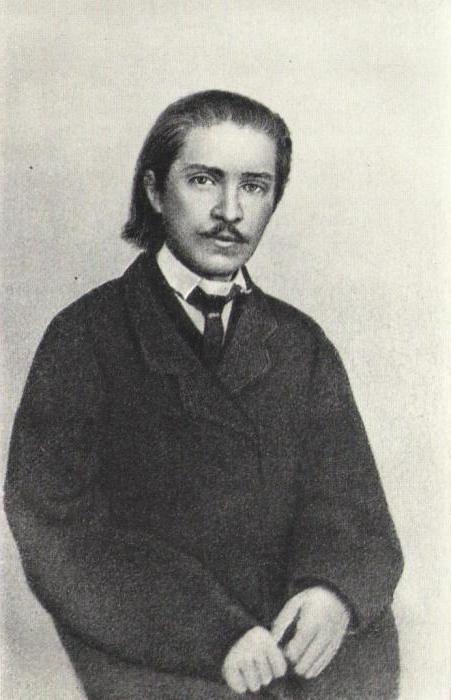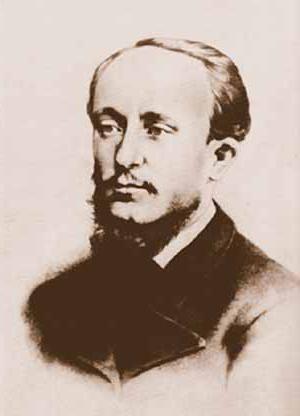Pyotr Nikitich Tkachev (1844-1885) - a famous Russian revolutionary, ideologist of populism. The article details his biography, views and ideas.
Childhood and youth
Pyotr Nikitich Tkachev was born on June 29, 1844 in the Pskov province (the village of Sivtsovo). His parents were small noblemen. First, Pyotr Nikitich attended the 2nd St. Petersburg Gymnasium. Then from the fifth grade of this gymnasium in 1861 he entered the University of St. Petersburg, at the Faculty of Law. However, Peter Tkachev did not have to study. The fact is that at this time student unrest began, as a result of which the university was closed. Among the other active participants in these unrest, Tkachev was first imprisoned in the Peter and Paul Fortress (in October), and then in Kronstadt, from which he left in December.
Defense of the dissertation, a feature of revolutionary views
The tsar ordered to leave Peter Nikitich in the capital, entrusting his mother. Tkachev did not have the opportunity to continue his studies at the university. However, after seven years, he still passed the exams externally, presented his dissertation and became a candidate of law. Somewhat later, criticizing Lavrov for being too divorced from the revolutionary movement, Pyotr Nikitich wrote about himself that since the days of the gymnasium he had known no other society than those young men who were fond of student gatherings, arranged reading rooms and Sunday schools, started communes and artels, etc. He was always not only with them, but also among them, even when he was in the Peter and Paul Fortress. The orientation of Pyotr Nikitich to the immediate solution of various tasks of the revolutionary movement formed the characteristic features of his socialist concept.
Participation in revolutionary associations
Tkachev, while still studying at the gymnasium, began to read socialist literature. He became acquainted with the publications of Ogarev and Herzen, with articles by Dobrolyubov and Chernyshevsky. Already in the early verses dating back to 1860-62. (some of them were on the lists), Tkachev preached the peasant revolution. He finally embarked on the revolutionary path since 1861. Since that time, Tkachev actively participated in the student movement, as a result of which he was subjected to arrests, searches, interrogations many times. Petr Nikitich was constantly under police surveillance. He served a prison term almost annually.

In 1862, his belonging to the circle of L. Olshevsky was discovered. This circle was preparing to publish several proclamations calling for the overthrow of the king. In 1865 and 1866, Pyotr Nikitich Tkachev was close to the organization of I. A. Khudyakov and N. A. Ishutin, and in 1867 and 1868 to the Rublev Society, whose members propagated under the guise of wandering teachers. It is also known that Petr Tkachev in 1868 adjoined the Smorgon commune, which is the predecessor of the organization created by S. G. Nechaev. Then, in 1868-1869, Petr Nikitich, together with Nechaev, was a member of the steering committee of the St. Petersburg student movement.
The beginning of literary activity
In June 1862, the literary work of Pyotr Nikitich began. His literary talent revealed in the 60s. As one of the theorists of revolutionary populism, a brilliant critic and publicist, Tkachev collaborated with several progressive magazines. It should be noted that already in his first articles devoted to criticism of the judicial reform, which the government planned, a noticeably revolutionary-democratic, oppositional mood. They were published in the magazines Epoch and Vremya of the Dostoevsky brothers, as well as in the Library for Reading.
Acquaintance with the works of Marx
In a series of articles created between 1862 and 1864, Pyotr Nikitich put forward the idea of changing the existing social relations in Russia on a socialist basis by establishing a network of educational land-industrial associations, primarily on uninhabited lands. Around this time, Peter Nikitich Tkachev met some of the works of Karl Marx.
His biography in December 1865 was marked by the fact that for the first time in the legal press of our country he outlined the main thesis of K. Marx related to the materialist understanding of history, which he presented in the preface to "To a criticism of political economy." It should be noted that by this time Tkachev was already a permanent employee of two democratic magazines (Delo and Russkoe Slovo). He actually replaced Pisarev at the post, which was placed in the Peter and Paul Fortress. Petr Nikitich propagated the above thesis in the future, right? in its interpretation, somewhat simplified.
Design concept Tkachev
In 1868, P. N. Tkachev printed the charter of the First International in translation (in the appendix to the book of Becher), as well as the charter of the People's Bank of Proudhon. The views of Peter Nikitich towards the end of the 1860s developed into a certain concept. He called for a political and social revolution in the country. This concept was expressed in the “Program of revolutionary actions” that emerged from Tkachev and Nechaev’s circle.
Peter-Pavel's Fortress
I must say that much of what P. N. Tkachev wrote was either forbidden, or did not pass under the terms of censorship, or was selected during numerous arrests. When Tkachev was again arrested during another student unrest (in March 1869), he was immediately charged with 3 literary accusations. The first of them is for the creation and publication of an appeal to "Society!", Which presented the requirements of students; the second - for the publication of a collection entitled "Ray", published instead of the banned "Russian word"; the third - because he printed the book "The Work Question" by E. Becher. This time the Peter and Paul Fortress became for Pyotr Nikitich a place of imprisonment for almost four years. In early 1873, Tkachev was sent into exile in Velikiye Luki, to his homeland. From there, he fled abroad with the help of M.V. Kupriyanov, also a revolutionary.
Life abroad, a polemic with Engels and Lavrov
Journalism, interrupted by arrest, resumed in 1872. Tkachev again began to publish his articles in Dela. However, he did not sign them with his surname, but with different pseudonyms (All the same, P. Grachioli, P. Gr-li, P. N. Postny, P. N. Nionov, P. Nikitin).
In London and Geneva, Pyotr Nikitich worked at one time with P. L. Lavrov (his portrait is presented above) in preparation for the publication of the journal “Forward!”. Nevertheless, his very first steps taken in exile were marked by serious polemics with F. Engels and Lavrov. In 1874, Tkachev's pamphlets The Tasks of Revolutionary Propaganda ... and The Open Letter to Friedrich Engels were published in Zurich and London. This polemic immediately put Peter Nikitich in an isolated position abroad.
The emigre literature of F. Engels, Lavrov, and others was in a slightly different position than Pyotr Nikitich. The essence of the disagreement between them was that Tkachev regarded the political struggle as an integral prerequisite for a future revolution. However, he underestimated the role of the masses in it, which many Russian emigrants could not agree with. In his opinion, the revolutionary minority should gain power, establish a new state, and carry out revolutionary transformations expressing the interests of the people. The latter can only take advantage of the results. Pyotr Tkachev was mistaken in his opinion that the autocracy has no social basis in Russia, that it is not an expression of the interests of a particular class. Friedrich Engels, in turn, in his articles he wrote answered with criticism of Tkachev’s views, which he considered petty-bourgeois.
Edition of the Nabat magazine
Pyotr Nikitich, stepping out of “Forward!”, Found supporters among the “Cercle Slave” circle (translated as “Slavic Circle”), which brought together Russian-Polish emigrants. With their help, Tkachev in 1875 began to publish the Nabat magazine in Geneva. In this magazine, he took the position of editor. This publication became an organ of the Jacobin movement, close to Blanquism, in revolutionary populism. Tkachev during this period openly expressed his socialist views, discussing the issues of theoretical substantiation of socialism, tactics and strategies of the revolutionary struggle. In the journal Nabat, Pyotr Nikitich conducted a polemic with P. L. Lavrov and M. A. Bakunin. His ideas, which at first did not have much influence, and often caused irritation, began to find supporters by the end of the 1870s. This happened as the turn of the Russian revolutionaries towards political and social methods and the demands of the revolutionary struggle.
"People's Liberation Society"
In 1877, Pyotr Nikitich, together with his adherents, managed to organize a "People's Liberation Society". This strictly conspiracy association was created with the help of the Blanquist communards from France (F. Courneux, E. Granger, E. Vayan and others). The society relied in its activities on some Russian circles (in particular, I. M. Kovalsky in Odessa and Zaichnevsky in Orel). Tkachev in 1880 collaborated in the newspaper "Neither God nor Lord" O. Blanca.
Nevertheless, the prejudice against Pyotr Nikitich remained very strong. So much so that Narodnaya Volya (according to V.I. Lenin, its activity was prepared by Tkachev's ideology) rejected the alliance with Nabat, which was previously assumed. “Nabat” ceased to be published after its short release in 1881 in the form of a newspaper.
Publish under various aliases
Tkachev, living abroad, continued to be published in the legal Russian press under various pseudonyms, which (All the same, P. Gracioli and others) we have already listed. As one of the main employees of the Cause, Petr Nikitich published many articles on philosophy, law, history, pedagogy, economics, etc. However, after the editor of this journal, G. E. Blagosvetlov, died, cooperation became not so regular. Tkachev’s articles appeared less and less. It seemed that the literary and revolutionary activities of Pyotr Nikitich were fading, but in reality this was not so.

To date, some new facts have become known regarding the last years of Tkachev’s life in exile. They testify to the fact that this Russian literary critic and revolutionary continued to actively create. Recently, the socialist newspaper Nabat (Le Tocsin) was discovered, which was published in the south of France (in Narbonne) in 1882. The editorials for her were written by Tkachev, who was hiding his name under the pseudonym Gracchus. Most likely, these press appearances can be considered the last.
Since November 1882, Tkachev’s disease progressed, as a result of which he ended up in the hospital. Peter Nikitich died in Paris on December 23, 1885. His selected works forever entered the history of the revolution.
The philosophical views of Tkachev
At first glance, in such a rich and diverse activity of the tribune-publicist-politician there is no room for serious philosophy or it has a subordinate, purely random role. Indeed, on the formal side, Pyotr Nikitich Tkachev himself, apparently, gives us a reason for this assumption. After all, he was a fierce critic of all philosophical systems.
However, in one of his first articles (published in 1863, “Legal Metaphysics”), Tkachev formulated his program of reform of philosophy. He says that it is necessary to build a true, fruitful, living philosophy that is alien to any kind of metaphysics. It must link together the parts of social science that are forcibly dissolved. This philosophy will be a social, social science. It should be beneficial to society.
Tkachev as a publicist often returns to the problem of the benefits of philosophy. In his opinion, it should become the basis for the transformation of the world, an instrument of science, the core of a true worldview. As a politician, Pyotr Nikitich Tkachev especially developed the problems of revolution, sociology, a just and reasonable social structure. He called his philosophical position “realism” (or rationalism).
That such a curious person was Pyotr Nikitich Tkachev. Interesting facts about him are almost all connected with the revolution, to which he gave his whole life.